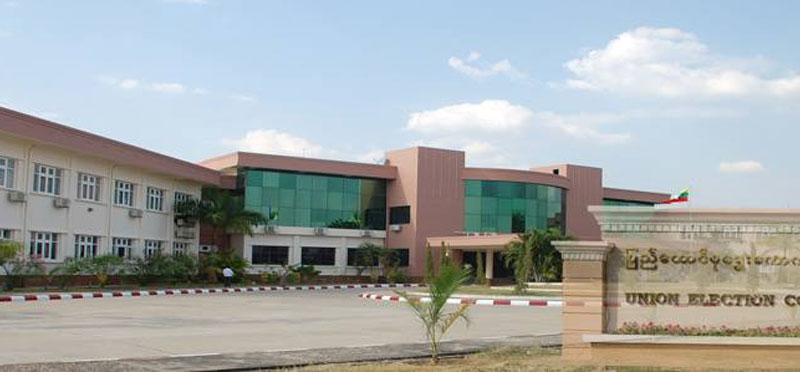The Union Election Commission (UEC) has rejected a proposal by Burmese nationalists seeking to establish a political party with an explicit goal of furthering their agenda, with the electoral gatekeeper saying its decision was made in line with the country’s Political Parties Registration Law.
One of the party’s would-be founders Myint Soe, also known as Maung Thway Chon, told DVB on Wednesday that the applicants were surprised by the UEC’s response, and were not satisfied with the commission’s explanation for denying their bid.
The nationalists — including former members of the Association for the Protection of Race and Religion, better known locally by its Burmese acronym Ma Ba Tha — submitted their application to form the Patriotic and United Party in August.
“We will ask the UEC why they have rejected our proposal and it was not fair. We will send a letter to them this coming Friday,” said Myint Soe.
As originally conceived, the party name was to include the number “135,” in reference to the tally of officially recognised ethnic groups in Burma. The number was later dropped from the proposed party’s name.
“We removed ‘135’ because we were concerned about having the party registration rejected due to this number,” Myint Soe told DVB last week, as he awaited word from the UEC on whether the party would be approved.
The designation of 135 indigenous ethnic groups is officially recognised by the government, with its origins in the 1982 Citizenship Law. Organisers of the Patriotic and United Party’s registration bid nonetheless wagered that incorporating the number in their application might jeopardise prospects for approval.
In the end, however, some of the party’s founding members did not pass muster on the basis of the Political Parties Registration Law, according to a rejection letter sent by the UEC late last month.
DVB sought comment from the commission on Wednesday but was not successful.
Nationalists have increasingly emphasised the codification of citizenship based on the framework of 135 “ethnic nationalities” in recent years, most ardently — and for some, most controversially — to make the case that Rohingya Muslims in Rakhine State do not have a legitimate claim to citizenship.
If there was a basis for the political aspirants’ decision to drop “135” from their proposed party’s name, it might be found in concern over Political Parties Registration Law provisions that include a prohibition on political parties writing, delivering speeches or organising and instigating that might cause conflict or that might affect dignity and morals relating to nationality, religion, individuals or the broader public.
[related]
“We hope the UEC will accept our proposal. Our policy is anti-Bengali and to lead in the development of Buddhism,” Myint Soe told DVB in August, referring to self-identifying Rohingya in a way commonly employed in Burma to imply that members of the Muslim minority are illegal immigrants from neighbouring Bangladesh.
The UEC collaborated with the ministries of Immigration and Home Affairs to scrutinise the profiles of the Patriotic and United Party’s founders in the months since its registration bid was submitted.
“We need to know which persons are not qualified according to the law,” said Myint Soe. “Officials from the ministries told me that they didn’t find any problem after the scrutinising. We hope that our letter in response will get a response.”



